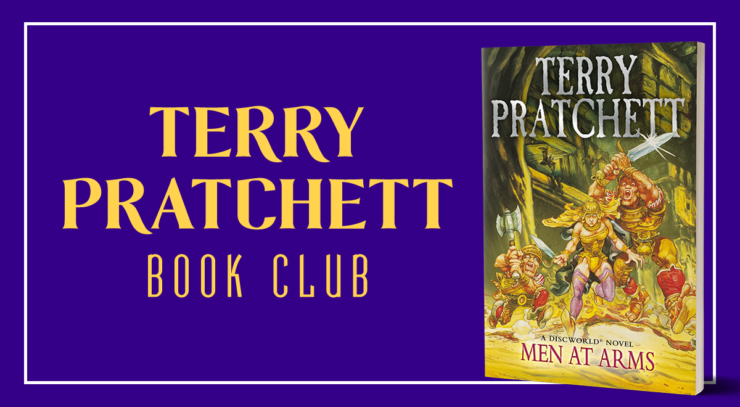We’ve got time, someone explain what a “gonne” is…
Summary
Vimes is so depressed about being ordered to do nothing about Hammerhock’s murder that he starts drinking again. Carrot is dismayed to find out that Angua is staying at Mrs. Cake’s, but Angua quickly runs off, turns into a werewolf, runs into Gaspode, and heads back to Hammerhock’s place to look for clues. Vimes heads back to Sybil’s and puts on his gentleman’s suit for dinner. He sobers up and listens to rich people be staggeringly speciesist about the new sorts living in the city. One of the guests is Dr. Cruces. Carrot comes by with the card that reads “GONNE” and Vimes decides that he wants to get a look inside Hammerhock’s workshop after all. They find a lead disc embedded in the wall, a note with writing they can’t translate, and a couple of red threads. As they’re walking back to the Watch House, they head over the bridge and Vimes notices another dead body—it’s Beano the clown.
Buy the Book


All the Horses of Iceland
Colon sends Cuddy and Detritus to the Alchemists’ Guild the next day with the note they can’t decipher. They are welcomed in by a fellow named Sendivoge, who takes them into an experiment involving billiard balls. Silverfish tells them that the note was one of Leonard da Quirm’s pieces of work, a formula for No. 1 Powder, which has sulphur, saltpeter, and charcoal. The word “ennogeht” is also on the paper, but Leonard wrote things backwards… Colon and Nobby head to the Fools’ Guild to ask around about Beano. Dr. Whiteface insists that there is nothing to investigate and that it was an accident, while Boffo the clown knows it had something to do with the Assassins Guild and suggests that they “find [Beano’s] nose.” They note that he claimed to have seen Beano yesterday morning, when his corpse seemed to have been dead longer than that. d’Eath resolves to kill Vimes for his interference.
Carrot shows up to take Angua for a city tour before their start of shift. Vimes wakes up and goes over his notes; suddenly there are explosions around his room. Someone’s trying to kill him and Vimes tries to find the person with no luck. He questions a gargoyle on the roof across the way and the gargoyle tells him that the person who tried to kill him had a sort of firework stick that he was firing at him. Carrot’s tour takes Angua to the Beggars’ Guild of the city, which has the Guild quite surprised—they only found a body a few minutes ago. The dead woman in question is named Lettice Knibbs, the lady’s maid to Queen Molly, the head beggar. The person who killed her was trying to kill Molly; Lettice had tried on her dress. They find more metal and broken glass at the scene from the new weapon. While Cuddy and Detritus are on patrol, Cuddy begins to teach Detritus math. They see a person running and begin to chase them. Vimes reads the reports of Colon and Cuddy from their work talking to the Fools and Alchemists and begins putting things together about this new weapon called a gonne.
Cuddy and Detritus chase their quarry into the dead-end Grope Alley, and realize that the person only had a stick, but Cuddy smelled fireworks. Still, he knows it’s their job to continue, so they head down the alley. The person they’re chasing has picked the lock and entered the pork futures warehouse, so they follow and proceed to get shot at. Captain Quirke finds Vimes and places him under arrest. He’s brought to the Patrician, who tells him that he’s disobeyed orders to stay out of this business. Vetinari demands Vimes’ sword and badge, but Vimes can’t give him the badge. Since he’s supposed to be getting married tomorrow, the Patrician agrees to let him keep it until then, when he’s to retire. He’s standing down the Night Watch. Cuddy and Detritus have survived the onslaught, but Cuddy is about to freeze to death and Detritus is suddenly a genius (on account of the cold superconducting his silicon brain). He throws Cuddy out a window to get him to safety, so he can bring help. Cuddy lands on Dibbler’s food cart and demands to know who has keys to the pork futures warehouse.
Commentary
The first Watch book, we don’t really get into the problems of policing. Or crime and how society defines it. Or the ways in which we criminalize aspects of identity. Or how laws are not guaranteed to be just in any sense. This book, on the other hand, goes hard on all of these terms, and is arguably a lot better for it. We talked about Vimes’ rule of socioeconomic unfairness in the first section, but that bit, clever though it may be, is really just the tip of the cake slice of inequity. As it were.
Starting with Sybil’s dinner, really. And all of her terrible friends who aren’t even really her friends, just people she’s forced to know by the circumstance of wealth. Sam is thinking about how these are not the sort of people he’ll ever be arresting because that amount of money doesn’t just make you untouchable—it also makes all the crimes you might want to commit perfectly legal. Owning a slum is not a crime, but being the sort of person who needs to live in one certainly is. The point is that Vimes notes “If you had enough money, you could hardly commit crimes at all. You just perpetrated amusing little peccadilloes.” And it doesn’t matter what time you’re reading this, or what time I read it because any time is too early in the day for that.
But it also shows up in bruising little asides that are sort of in Vimes’ head but then again perhaps not? Like this one when he’s thinking about the effect of chance on police work: “So many crimes are solved by happy accident—by the random stopping of a car, by an overheard remark, by someone of the right nationality happening to be within five miles of the scene of the crime without an alibi…” Which is a bit of narrative that may be a thought still coming from Vimes, but might also be handy insert from the author, and I do love how sometimes with Pratchett you can’t tell. Because in any other author’s hands, that would usually seem like an error. Only the especially clever can pull off that kind perspective runaround and still read seamlessly.
Then there’s Cuddy’s list of ways you can break the law any time you’re out on the street (including “Lingering While Being the Wrong Color/Shape/Species/Sex”). And then the footnote about the axiom “Honest men have nothing to fear from the police” being under review by the Axioms Appeal Board. Those bits along with the many discussions about how people are handling the new recruits to the Watch, they just keep prodding at the system. Perhaps my favorite thing is how the “diversity hire” choices may irk the old guard, but we can readily see how it’s making them better—Colon is reading, for Pete’s sake.
But we haven’t gotten to the tougher meat of these observations, which go hand-in-hand with the gonne itself. We’ve only touched on it: “But that wasn’t human nature, was it? Sometimes things were too fascinating to destroy.” That is leading us down an even darker well, one that shapes the rest of this story.
The first time I read this book, I had not yet watched Twin Peaks, so I missed all the references Vimes gives us to Dale Cooper, from the I’m-on-the-path-I-have-to-follow-it to his coffee “black as moonlight on a moonless night.” But the irony here for me is that Vimes is absolutely not the Dale Cooper of this crew: Carrot is.
Carrot falls into a very specific type of lawman in entertainment—preternaturally good at what they do, preternaturally knowledgeable, preternaturally liked by everyone. And sure, he might seem simple or ill-equipped at first, but that’s just because you’re not paying attention. It’s Carrot, and Dale Cooper, and Benton Fraser, and Angus MacGyver (technically not a cop, but the work gets awfully close in that show), even Benoit Blanc from certain angles. There are other characters who fit this purview outside of that job, but it’s always fascinating when you associate them with law. Brings up a lot of questions about the concept of lawfulness and what its value in society really is.
Asides and little thoughts:
- Leonard da Quirm’s portrait of Mona Ogg. Because of course the Disc’s version of the Mona Lisa is a painting of a woman related to Nanny in some way.
- I was thinking about the description of Dr. Whiteface, and I’m fairly certain that he’s supposed to be a Pierrot-type clown? Which is mostly fun to me because I enjoy the intersection between the clowning and pantomime traditions, but it’s wonderfully on point that the person in charge would be the clowning figure who’s less of a comedian than the other types of fools. (Pierrot is typically a depressed figure who loses his love Columbine to Harlequin.)
- Carrot being the kind of person who could make the city break out into a full musical number is a thing that I want, though. Has anyone ever made a Discworld musical? Now I’m upset all over again that Stephen Sondheim is dead—he would have been perfect for that job.
Pratchettisms:
He’d faced down trolls and dwarfs and dragons, but now he was having to meet an entirely new species. The rich.
He hated being sober. It meant he started to think. One of the thoughts jostling for space was that there was no such thing as a humble opinion.
The river Ankh is probably the only river in the universe on which the investigators can chalk the outline of the corpse.
The air smelled of a limited life expectancy.
It was shaped like a pair of artificial breasts, the sort that are highly amusing to rugby players and anyone whose sense of humor has been surgically removed.
“That’s what I tell myself. I say, ‘Fred, whatever happens, you’re brighter than Detritus.’ But then I say, ‘Fred—so’s yeast.’”
And they were also slightly less intelligent than he was. This is a quality you should always pray for in your would-be murderer.
She vaguely suspected that Carrot was trying to court her. But, instead of the usual flowers or chocolate, he seemed to be trying to gift-wrap a city.
Slowly, with fingers that suddenly felt like bananas, and bananas that didn’t belong to him at that, Vimes undid this sword belt.
Next week we’ll read up to “You didn’t need daft old herbs to make your life a problem, if you spent one week every month with two extra legs and four extra nipples.”










